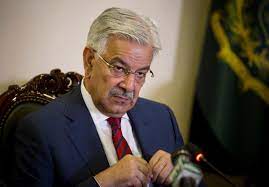ISLAMABAD: Pakistan’s Defence Minister Khawaja Asif has said the chances were that former PM Imran Khan could be tried in a military court for his alleged involvement in the May 9 incidents in which military and state installations were attacked by his party workers, according to a media report on Sunday.
Imran, 70, could stand trial in a military court if evidence of his involvement in the May 9 violence surfaced in the coming days, Asif was quoted as saying by The Express Tribune newspaper.
He also confirmed that no case had been registered against the Pakistan Tehreek-e-Insaf chief so far in connection with the attacks. “Definitely…there are chances that Imran can be tried in a military court,” the minister said while responding to a question if the deposed premier could be prosecuted under the Army Act.
His remarks came days after Interior Minister Rana Sanaullah said Imran would be tried in a military court as the former PM was the “architect” of the May 9 incidents.
Imran’s party found itself in hot waters when protesters allegedly belonging to the party attacked civil and military properties on May 9 following his arrest in the Al-Qadir corruption case.
The trial of people involved in the attacks on military installations in different parts of the country, including the attack on General Headquarters in Rawalpindi as well as Lahore’s Jinnah House where the Corps Commander was residing, has already begun.
Earlier, Asif was reported as saying that no decision had been made in connection with trying the cricketer-turned-politician under the Army Act, but he had not ruled out that possibility on the grounds that Imran was the mastermind behind the May 9 violence and knew everything about what was happening on that day.
Both the Defence and Interior Ministers’ statements hinting at Imran’s trial in a military court stem from the federal cabinet’s decision that the protesters who vandalised military installations on May 9 would be tried under the Army Act and Official Secrets Act.
The government ministers have repeatedly said that no new military courts would be established and the suspects would be tried in the “special standing courts” that were already functioning under the Army Act.


